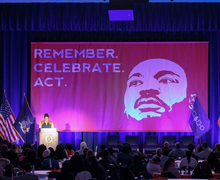University responds to Kindle complaints
Syracuse University will not continue to purchase Amazon.com’s Kindle e-book readers after receiving complaints from organizations that advocate for the blind.
SU and the University of Wisconsin-Madison will not purchase Kindles because they are inaccessible to blind students, the National Federation of the Blind announced Wednesday.
Kindle 2 and Kindle DX readers both have a text-to-speech feature that can convert any text into spoken words for someone to listen to through headphones. Despite this feature, the menus and bookstore on the Kindles are inaccessible to blind people, as someone would have to see where the menus are before enabling the feature, according to a news release from the National Federation of the Blind.
Amazon.com has been researching a way to make the Kindle accessible to the blind, a company spokesman, Drew Herdener, told The Associated Press.
SU started a pilot program with Amazon Sept. 24 and currently has two Kindle DX devices available for students to borrow at E.S. Bird or Carnegie libraries. Both libraries loan the e-reader for a 24-hour period.
The material already downloaded on the Kindle DX includes e-books from science and engineering courses at SU, said Pamela McLaughlin, Bird’s director of communications and external relations.
The library bought the Kindles to experiment with new technology. SU had initially planned to purchase more Kindles, offer them at more locations on campus and extend the available content if students responded well to the technology.
‘We prefer to provide accessible technology, but there is not an e-reader that is accessible to the blind right now,’ McLaughlin said.
The decision for SU to discontinue its purchase of any more Kindles was influenced by concerns from the Burton Blatt Institute, an advocacy group for people with disabilities that has its world headquarters at SU, McLaughlin said.
Eve Hill, a senior vice president at the Burton Blatt Institute’s Washington D.C. office, said the institute discovered issues with the Kindle in February or March, when the Kindle 2 was released.
‘Unless you have vision, you can’t even turn on the text-to-speech feature (or buy a book),’ Hill said in an e-mail.
The text-to-speech feature has also experienced problems because some publishers have lobbied Amazon to stop using the feature on its books, concerned that it could compete with an audio book, Hill said.
One book publisher, the Hachette Group, has said that it will only allow its books to be translated to speech if there is no audio book version being made, Hill said.
The Kindles have the capability to wirelessly download books, as well as newspapers and magazines.
Published on November 15, 2009 at 12:00 pm





